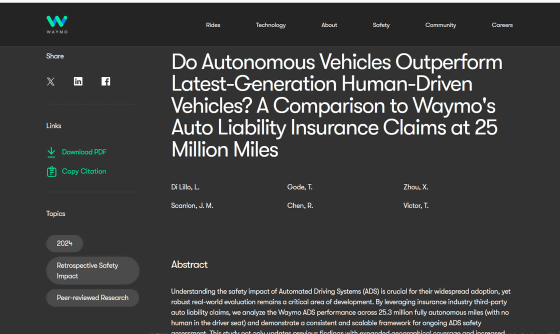Waymo, which plans to launch in Japan, announces survey data showing that self-driving cars have fewer accidents and are safer than human-driven cars.

Waymo , a self-driving car development company under the umbrella of Alphabet, the same group as Google, has released survey data showing that Waymo's self-driving cars have fewer accidents and are safer than vehicles equipped with advanced driver assistance systems (ADAS) driven by humans.
Do Autonomous Vehicles Outperform Latest-Generation Human-Driven Vehicles? A Comparison to Waymo's Auto Liability Insurance Claims at 25 Million Miles
https://waymo.com/research/do-autonomous-vehicles-outperform-latest-generation-human-driven-vehicles-25-million-miles/

New Swiss Re study: Waymo is safer than even the most advanced human-driven vehicles
https://waymo.com/blog/2024/12/new-swiss-re-study-waymo
On December 19, 2024, Waymo announced the results of a study conducted in collaboration with Swiss Re , a major Swiss insurance company, comparing the safety of Waymo's self-driving cars with that of human-driven cars. The study used automobile liability claims data as an indicator of at-fault accidents and compared more than 500,000 liability claims made by human drivers sent to Swiss Re with liability claims made by Waymo.
The analysis found that Waymo's self-driving cars have 88% fewer property damage claims and 92% fewer personal injury claims than human-driven cars. Waymo's self-driving cars have driven 25.3 million miles so far, with only nine property damage claims and just two personal injury claims. By contrast, a human driver driving the same distance would have 78 property damage claims and 26 personal injury claims.

by
Waymo's self-driving cars also performed better when compared to human-driven vehicles (2018-2021 model year vehicles equipped with cutting-edge ADAS such as automatic braking, pre-collision warnings, lane-keeping assistance, and blind-spot warnings). Compared to this group, Waymo had 86% fewer property damage claims and 90% fewer personal injury claims.
The graph below compares the number of property damage claims (left) and personal injury claims (right) that occur per million miles (about 1.6 million km). The blue line shows all cars driven by humans, the yellow line shows a human driving a vehicle equipped with the most advanced ADAS, and the green line shows Waymo's self-driving car, and in both cases, Waymo is significantly less likely to cause an accident.

'While auto insurance claims data has historically been used to assess the liability and risk of human drivers, it is also a powerful tool for evaluating the safety performance of self-driving cars,' said Mauricio Peña, chief safety officer at Wanmo. 'This is truly groundbreaking research that not only validates the strong safety record of Waymo's self-driving technology, Waymo Driver, but also provides a scalable framework for continuously evaluating the impact of self-driving cars on road safety.'
Ali Shakarami, International Head of P&C Solutions at Swiss Re said: 'Our research shows how insurance data can provide the necessary framework to assess the safety of autonomous vehicles and support their widespread adoption. By analysing a large dataset across multiple cities, we have gained a deeper understanding of how this technology performs in real-world conditions. These promising results help highlight the potential this technology has to create a safer future for our roads.'
Waymo also plans to begin testing autonomous vehicles in Tokyo in early 2025.
Finally, Waymo, the self-driving car company, will expand to Japan, partnering with Nihon Kotsu and GO to start testing in Tokyo from early 2025 - GIGAZINE

Related Posts:






